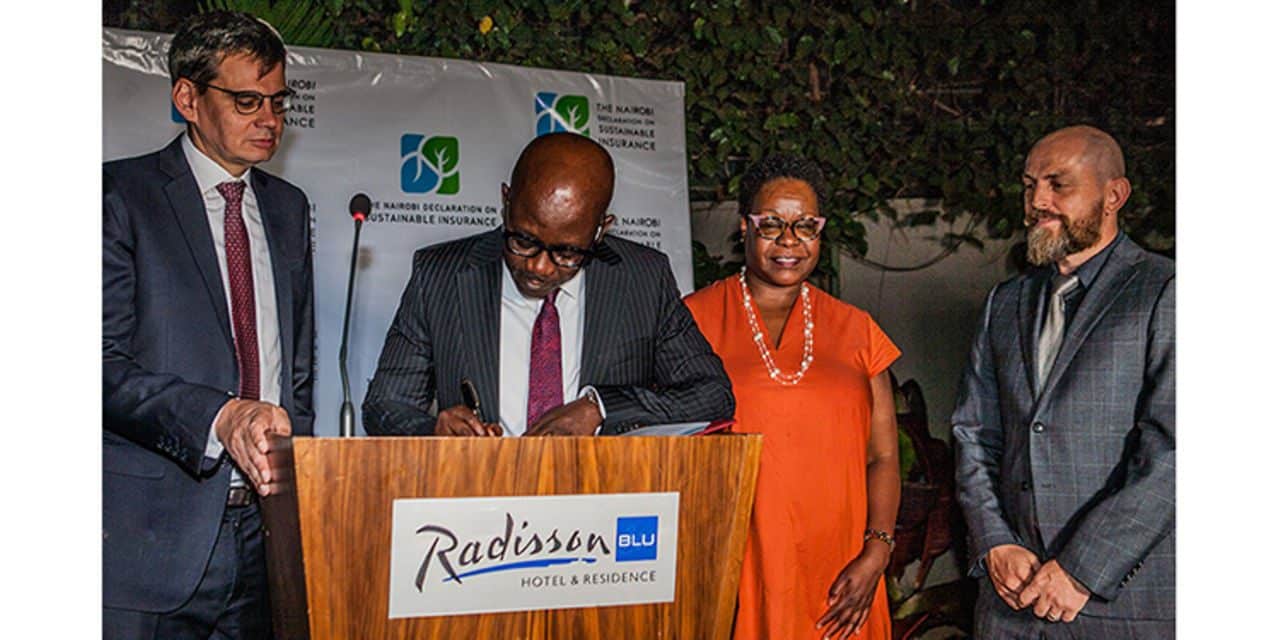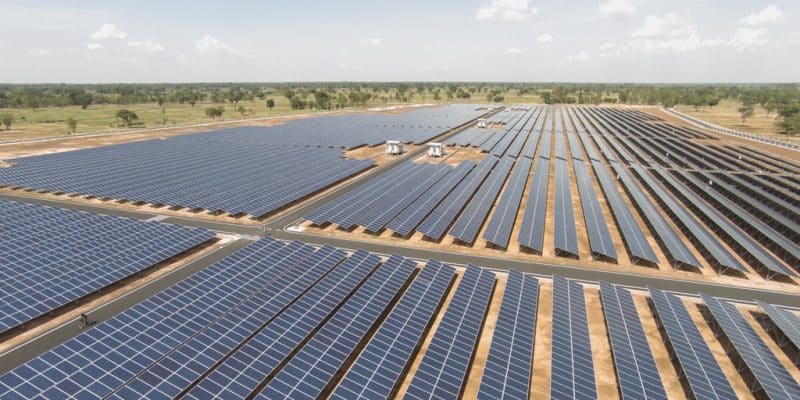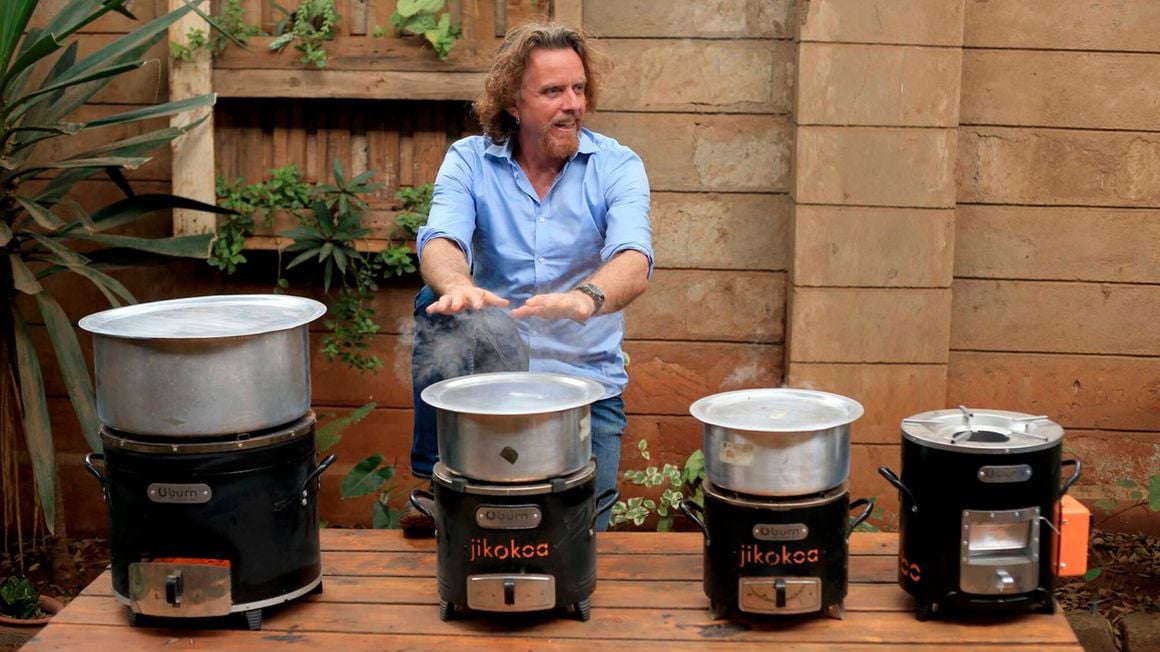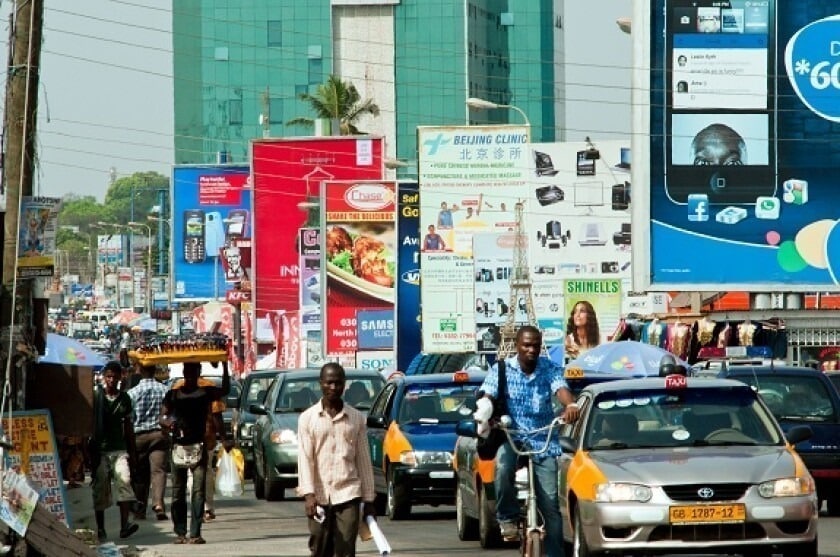Leading insurer Prudential plc has taken its climate action drive a notch higher by signing the Nairobi Declaration on Sustainable Insurance (NDSI). The NDSI is a collaborative effort by the insurance industry to provide broader solutions to the climate change challenge.
The signing of the declaration continues Prudential’s journey of confronting climate change. The insurer has in the past embraced various initiatives as it bids to cut its own carbon footprint while supporting its customers and nations to tackle climate change.
The Nairobi Declaration on Sustainable Insurance
Prudential signed the NDSI on September 5 at the FSD Africa and Private Infrastructure Development Group (PIDG) cocktail on the side-lines of the Africa Climate Summit 2023 in Nairobi. Prudential Africa Chief Executive Officer, Emmanuel Aryee Mokobi, accompanied by his Deputy Nick Holder; Marketing and Communications Advisor for Africa, Janice Kemoli; and Head of Enterprise Risk Management for Africa, Roelof Coertze, graced the occasion.
While commenting on this, Mr Mokobi emphasised the firm’s commitment to being a voice for a just and inclusive transition to clean energy in emerging markets in line with the companies ESG obligations
According to the UN Environment Programme’s Principles for Sustainable Insurance, the NDSI is “a declaration of commitment by African insurance industry leaders to support the achievement of the UN Sustainable Development Goals.”
UNEP describes the SDGs as “a shared vision to end poverty, rescue the planet, and build a prosperous and peaceful world”.
But, adds the UN agency in the NDSI introduction: “While progress is being made in many places, action to meet the SDGs is not yet advancing at the speed or scale required…”
This is where financial sector players such as Prudential, come in.
The NDSI document points out that, “as risk managers, insurers and investors, the African insurance industry has a key role to play in promoting economic, social and environmental sustainability—in other words, sustainable development.”
5 pillars
The NDSI is based on five pillars. These are: Risk Management; Insurance SDGs; Investment in a net-zero emissions economy; Policy, regulatory and industry engagement; and Promotion of the adoption and implementation of the four Principles for Sustainable Insurance across African insurance markets.
Mr Mokobi adds that Prudential will “collaborate within the working groups to ensure that together, we achieve the goals of NDSI and push our common agenda.” He notes that the NDSI builds on the work of the UN-convened Net-Zero Asset Owner Alliance (NZAOA), where Prudential has been a member of since 2021.
Net-zero by 2050
Prudential is committed to decarbonising its portfolio of assets to net-zero by 2050 and having carbon neutral operations by 2030. Its climate targets include decarbonising its operations and its investments, and engaging with its investees. Notably, 99 percent of the Group’s carbon footprint is from financed emissions.
Mr Mokobi explains that Prudential’s pursuit of its net zero target by 2050 adheres to a principle that the firm values. The insurer is keen to hit its set target while ensuring a just and inclusive transition in the markets it operates in, including emerging ones in Asia and Africa.
Prudential champions the acceleration of de-carbonisation in the emerging markets it operates in, highlighting that such markets may need different de-carbonisation pathways to developed markets. This is in line with its environmental, social and governance (ESG) obligations.
Mr Mokobi appreciates that the financial industry can play an important role in accelerating the energy transition. He says an enabling environment will be crucial in unlocking the insurance sector’s ability to mobilise transition finance.
Transition finance
For emerging markets, raising adequate transition finance is a big challenge – a major barrier to sustainable development for sectors and entire economies.
In 2019 and 2020, an estimated $11.4 billion was committed to climate adaptation finance in Africa. More than 97 percent of the funds came from public actors and less than three percent from private sectors. This is significantly less than the $52.7 billion annually to 2030, it is estimated African countries will need.
To bridge this gap, emerging markets have issued less than 10 percent of all sustainable debts, and majority of this 10 percent is coming from governments. Corporate organisations are not issuing sustainable debt yet.
To support this, Prudential issued a white paper with a threefold purpose. One is to define the case for a just and inclusive transition and its place in meeting the Paris Agreement. Secondly, it highlights the importance that Prudential places on ensuring the transition to a low-carbon economy is just and inclusive. Thirdly, it explores case studies and further actions required, both from Prudential and the wider market. Prudential believes that by using its influence to limit the impact of climate change, its policyholders will benefit, both through reduced impact on their daily lives, and through limiting financial impact on the portfolios it manages for them.
Stronger collaboration
Prudential believes a stronger collaboration between the public and private financial sectors is a crucial element to scale adaptation and resilience finance in Africa and globally. According to Unep’s Adaptation Gap Report 2022, titled Too Little, Too Slow, the estimated annual adaptation needs range from about $160 to $340 billion by 2030.
Making transition finance a reality requires the cooperation of many stakeholders: Regulators, energy firms, central banks, securities exchanges, corporates, and financial institutions, among others.
To add out voice to the importance of collaboration, Prudential Deputy CEO for Africa, Nick Holder, joined other panellists at the UN climate change high level champions dialogue to deliberate on how African insurers, banks, and investors, collaborate with the public sector to scale finance for adoption and resilience in the regions. Mr Holder stressed the need for integrating regulators in the formation of investment instruments, as this would facilitate the process and help in the development of pre-approved or easily accepted investment instrument. He also emphasised the need for Blended Finance with guarantees from Global institutions and Governments to make investment secure.
About Prudential plc
Prudential plc provides life and health insurance and asset management in 24 markets across Asia and Africa. The company’s mission is to be the most trusted partner and protector for this generation and generations to come, by providing simple and accessible financial and health solutions.
Prudential fully supports the just and inclusive transition to clean energy, and published a White Paper on this last year.
Read original article









